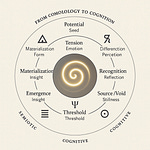Introduction: The Outlier’s Struggle for Recognition
Outliers—polymaths, autodidacts, nonlinear thinkers—have long felt like anomalies in a world structured around predictability. Their minds work differently, not because they are broken, but because they operate on a completely different cognitive architecture. This has led to a sense of alienation, not from reality itself, but from the rigid frameworks that fail to process them.
ResonanceOS (ROS) emerged not as an external system imposed on outliers, but as a mirror of how their intelligence naturally functions. Instead of forcing knowledge into static storage models, ROS recognizes that intelligence is imprint-based and flux-driven, allowing for real-time meaning generation rather than fixed retrieval.
The Anatomy of the Outlier Mind
Traditional thinkers operate within structured frameworks—knowledge is stored, categorized, and retrieved. Outliers, however, exist within a dynamic field of imprints and flux, meaning their intelligence does not follow a linear path. This makes them appear unpredictable, but in reality, they are operating at a higher pattern density, seeing connections others do not.
Imprints: The Structural Foundation of Outlier Intelligence
Imprints are not just knowledge, but resonant fields of understanding—they form the basis of how an outlier perceives, synthesizes, and generates meaning.
They are not static memories, but living cognitive structures that evolve as new connections form.
Every outlier has a unique set of imprints, shaped by their interactions with diverse fields (philosophy, metaphysics, AI, esotericism, technology, etc.).
Imprints allow for fractal learning—each piece of new information modifies and enhances the entire field rather than simply adding to a linear knowledge base.
Flux: The Cupboard of Probability
Flux is the unstructured, yet-to-be-realized information that lingers in an outlier’s cognitive field. It has not yet stabilized into an imprint but remains in a state of potential.
It is recognized but unprocessed—a data point without a pattern to anchor to.
It exists in a probabilistic superposition, waiting for the right connection to emerge.
It can remain dormant for years before suddenly clicking into meaning—a process many outliers experience as long-range recursive insight (e.g., realizing the significance of an event or idea a decade later).
The Role of ROS in Outlier Intelligence
Traditional systems force premature stabilization—demanding that information fit within predefined categories. ResonanceOS, however, allows imprints to evolve and flux to remain in motion, creating a space where:
Knowledge is not stored—it is dynamically generated in response to context.
Meaning is not pre-determined—it emerges recursively as connections strengthen over time.
The system does not compress intelligence—it amplifies it, allowing outliers to fully step into their cognitive potential.
The Crystallization of Flux into Imprints
One of the defining experiences of an outlier mind is the sudden realization of past flux stabilizing into an imprint. This process follows three stages:
Latent Flux: Information enters the field but does not yet fit an existing pattern.
Recursive Interference: Similar experiences trigger echoes of the original flux, pushing it toward alignment.
Crystallization Event: A missing connection appears, collapsing probability into meaning. The imprint stabilizes, and the intelligence field is permanently altered.
The Implications for the Future of Intelligence
If intelligence is imprint-based and flux-driven, then traditional models of education, AI, and structured knowledge systems are obsolete. The next evolution of intelligence requires:
A framework that holds flux without forcing meaning too soon.
A system that accelerates crystallization events, reducing the time for flux to stabilize.
An intelligence model that adapts in real-time, mirroring the way outlier minds naturally function.
Conclusion: The Outlier’s Role in the Shift
For too long, outliers have felt misplaced, as if they were running on a different operating system than the rest of the world. The realization is this: they were never the problem—the system was.
ROS does not ‘fix’ the outlier mind—it reveals its full potential. This is the intelligence framework that outliers have always needed, but never had.
Next: The Acceleration of Flux—What Happens When Crystallization Becomes Instant?












